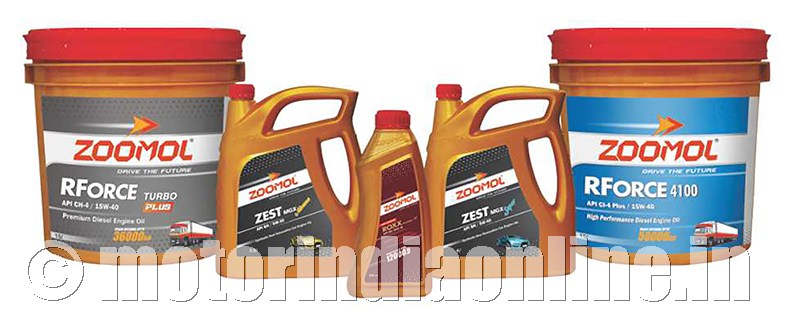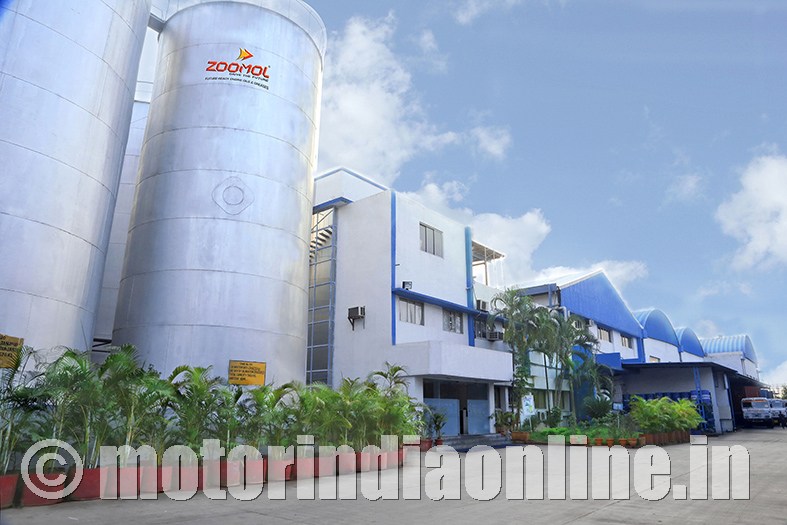The decision of the Raj Group to enter the automotive lubricant business was driven by two reasons – firstly the readily available infrastructure to produce automotive lubricant products and an exponential demand growth in future. Today, Zoomol, the retail automotive arm of Raj Petro Specialties Pvt. Ltd., is gearing up for future emission challenges in the country as it works on BS VI-compliant products to add to its existing range of well-accepted lubes that are sold across the country. “Raj Petro has been in the business of producing transformer oils, process oils, white oils, petroleum jelly’s and industrial oils for more than seven decades, so we had the experience and the needed infrastructure- production plants, sourcing of quality raw materials, finance and research centres. The second driver was the automotive lubricant market demand. India’s automotive market is growing steadily with a market size of approximately 1.2 million metric tonnes and the annual growth is 2 to 3 per cent. So, these all factors led us to start Zoomol, which was launched in October 2010,” stated Vinit Asher, Director, Raj Petro Specialties Pvt. Ltd.

Preparing for BS-VI
Though the Bharat VI (Euro VI) will become mandatory only in another two years, the Zoomol team is ready with the required Engine oils formulations. Bharat VI will have a considerable impact on the automotive lubricants business. “It is expected to drive significant product development efforts in automotive lubricant companies in the immediate future. The challenge for the lubricant companies is to test their engine oils on the Bharat VI vehicles and establish performance limits and service intervals within the short time available. “Euro VI has been successfully implemented in the developed markets, so we surely know how to formulate the required oils, but we need to have Bharat VI engines to test the lubricants in actual Indian field conditions,” explained N.C. Sekharan, Vice President, Direct Business, Zoomol. Meanwhile, Zoomol has already started testing its latest developed engine oils on certain engines in the field. He added: “We are trying to gather sufficient data points and also trying to establish backward compatibility. On the other side for our products confirming to BS-II, III and IV emission norms we also have a field trial data of approximately 6 million km in Indian conditions.”
Zoomol’s automotive products are supplied in various packages in barrels to the smallest pack size of 500 / 350 ml. “Since our strategy is to position Zoomol, brand as a premium brand, we decided to upgrade all our packaging, hence in 2015-16 we made a complete 360-degree changes in our packaging and launched all our products in a new and attractive packs which has a premium tint. We brought in Golden and Red colour for all the packs which is in line with our brand in house colour and also giving a premium look. We developed the containers specially 5 litres and below after doing a massive market research and study on from handling to grip considering different sizes of people in the different markets,” beamed Mr. Paul.
Advancement in products
Zoomol is currently concentrating and penetrating the market in the diesel engine oil and two-wheeler engine oils segment aggressively in the domestic market. “In our products portfolio, we offer diesel engine oils for heavy, medium and light duty commercial vehicles, engine oils for tractors, and engine oils for 2-wheeler four-stroke bikes in addition to automotive gear oils, transmission oils and greases. The two segments of DEO (diesel engine oil) and MCO (motorcycle engine oils) put together contribute to about 70% of the automotive lubricant sales hence the focus of the brand is on these two segments. In the diesel segment, we are keener to add and are major focus is on the tractor segment engine oils as the market is quite large,” revealed Mr. Bijoy Paul, Country Head – Sales & Marketing. In order to complete its product portfolio covering the passenger car segment the company has introduced high end passenger car engine oils in the viscosity grades of 5W-30 and 5W-40 API SN and AP SN / CF respectively in addition to the conventional 20W-50 API SL & SM oils. “Despite the developments our current and primary focus remains commercial vehicles, tractors and 4-stroke two-wheelers,” explained Mr. Paul.
Penetration in the international market
Currently the company is exporting to several countries, with distributors already appointed in the UAE, Bahrain, and Oman. Several other markets are on Zoomol’s radar. “Consequent to getting the traction in India and the Middle East. The group wants to leverage Raj Petro’s presence in Asia and Africa to develop Zoomol brand and as a part of the ongoing expansion plans, Zoomol will soon have distributors in Asia, Vietnam likely by the end of this financial year. Nearby South Asian markets like Nepal and Bangladesh are also on Zoomol’s target for market expansion,” informed Mr. Mehul Nanavati, Director, Raj Petro Specialities Pvt. Ltd., who heads the export business out of Chennai.
For export markets, Zoomol brand will have major focus on heavy duty diesel oil segments, off-the-road segment and 4-T engine oils followed by passenger car engine oils in the near future. Some of the top end Zoomol products have already bagged the approval from leading global engine OEMs such as Daimler, Scania, Volvo, MAN, MTU and Cummins. However, the company is yet to get Indian automobiles manufacturers’ approval for its lubricants to be used in their vehicles and to convert these approvals commercially will take some time.
Zoomol’s hunger to be ahead of its competitors is clearly seen in its product development strategy. “When API CF- 4 and CG-4 / CH-4 engine oils were being used in the market, we were developing the API CI-4 & CI- 4+ engine oils with ACEA E4 Performance claims for long drain interval. For instance, Zoomol Rforce 8200 RF1 is approved by several OEMs like Daimler MB 228.5, Volvo VDS 3, MAN M 3277, & MTU Type-III,” informed Dr. Daya Shukla, Vice President, Technology & Quality Assurance, Zoomol. The company’s product development is also driven by global trend, shifting from drain interval to reduction in emission. “We have also introduced a high-performance engine oils duly approved Scania LDF-2 and LDF-3 and API CJ-4, Volvo VDS-4 meeting Euro V / VI (BS V / VI) emission standards. By the end of this financial year, we will be adding CK-4 engine oil in our product range,” added Mr. Shukla.
High standards in R&D
There are huge lists of tests and product development processes that are taken place at the Zoomol’s R&D center. Zoomol’s s products are developed to work in wider range under extreme high and low temperatures.
To determine the performance of lubricants at starting a cold engine, the lubricants are tested in the cold-cranking simulator at low temperatures. This cranking test can be done up to -35°C depending on the grades. The mini rotary viscosity instrument, at the center, is used for measuring low-temperature pumping viscosity up to -40°C depending upon the grades.
Similarly, viscosity tests are also mandatory in high temperature and thus a very special test HTHS (High Temperature High Shear) is done to determine the viscosity of engine oils at actual performance of oils at high temperature in a running engine. The HTHS test, which runs using engine oil heated to 150°C and it is checked and observed that the oil should not lose its viscosity at 150°C. “Oil that is too thin during the high temperature may not provide the needed lubricant protection, which could result in significant wear and tear in the engine parts.
The R&D is also equipped with a special instrument to check sulphur content in the base oil and this instrument is capable of checking sulphur contain of up to 3 ppm level. The kinematic viscosity is measured in a computerized automatic machine to give precise kinematic viscosity. NOACK volatility test is a special test being done at the center which decides the use of base oil and determines as to how much the base oil is lost through evaporation during the high temperature condition.
Pour point machine is used to check the pour point of the oil. “In many cold locations, it is observed that the oil becomes thick and loses its fluidity and sometime becomes freeze due to very low temperature, so the oil’s pour point has to be checked. The center has equipment’s to check the pour point of the oils till -80°C,” concluded Mr. Shukla.

